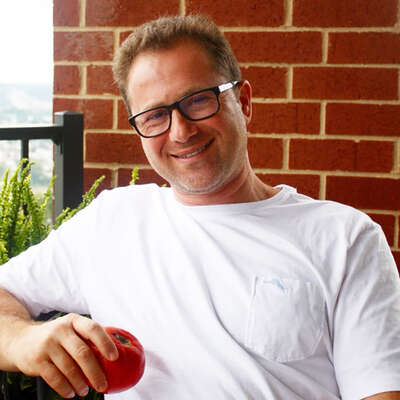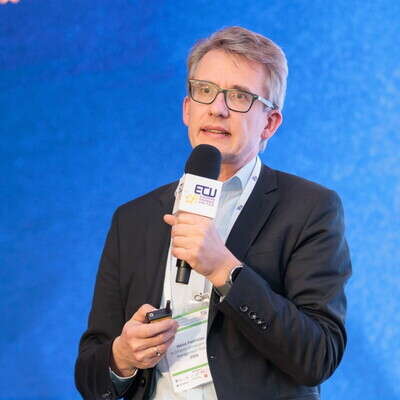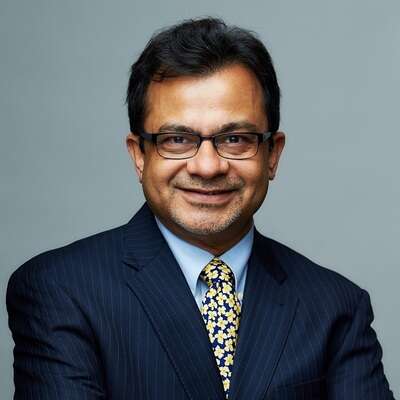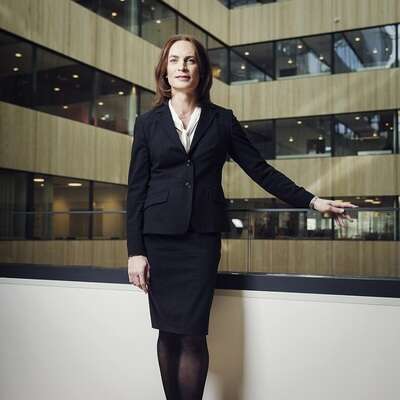As CEO of vertical farming company 80 Acres Farms, Mike Zelkind is building on a background in the food industry to shape the future of farming.
Boyden’s Leadership Series presents discussions with business and thought leaders from organizations across the globe. The series focuses on topical issues that offer executives, political leaders and the media insight into current trends in business and talent management in the global marketplace.
This issue features Mike Zelkind, CEO of 80 Acres Farms. In the interview, Zelkind discusses the role technology, big data and AI play in the farming and food sector, what the future holds for 80 Acres Farms, and the lessons he has learned from past roles.
Zelkind co-founded 80 Acres Farms in 2015 and has served as CEO since its inception. Prior to this, he held executive and managerial positions at Del Monte, Sager Creek, AdvancePierre Foods, ConAgra, 99 Cents Only Stores, A.T. Kearney and General Mills. Zelkind holds a bachelor’s degree in electrical engineering from the University of Minnesota and an MBA from Emory University’s Goizueta Business School.
Boyden: What is the mission of 80 Acres Farms?
Zelkind: At 80 Acres Farms, our mission is to provide accessible, nutritious, tasty and affordable produce to everyone, especially in areas where people cannot grow produce year-round themselves. We’re able to do this by building ultra-efficient farms that maximize footprint, use far fewer resources, and are located close to customer distribution centers. Our crops are free from pesticides and residues. They’re picked and delivered within hours, not days, which reduces food waste.
Boyden: What is the story on the investment side? Are notable investors and board members backing the company?
Zelkind: We started the company by self-funding. Our goal was to prove our business concept before we took anybody else’s money. We have phenomenal board members and investors backing us now. Our first investor was Shawn Harris with Orange Wings, who is the founder and former CEO of Nature’s Pride in Europe. She is an inspirational individual and a forward-thinking entrepreneur who built her own company from the ground up.
We have a wealth of food industry experience on our board, with folks like Ray DeRiggi, who ran Dole Foods and was President and COO of Conagra Foods. We have Roger Billingsley, former head of R&D and innovation at Dole Foods and Conagra, who has a PhD in food science and worked at Abbott Life Sciences and Kellogg. And we have Bobby Fisher, a great entrepreneur and community leader. He built and ran a company called Washing Systems and understands the entrepreneurial, M&A and chemical side of things.
Also on our board is Eli Aleho, who runs the energy practice at Virgo and has a background in hedge funds and private equity. Additionally, we have several other family offices and value-added investors representing customers and top growers in the country.
Boyden: You’re based in Ohio, with other operations in Arkansas, Alabama and North Carolina. What are your future expansion plans?
Zelkind: We’re driven by customers, and our locations are dictated by that to some extent. We’re also driven by where we have had operations in the past and where our teams live. As far as immediate expansion plans go, we are building two large farms in Hamilton, Ohio. It’s an ideal location for several reasons, including the city’s commitment to renewable energy and urban revitalization and proximity to six large metropolitan areas. We have a lot of customers there, and there’s tremendous demand for produce. Our future expansion plans are focused on customer demand, customer needs, and where their distribution centers are located. Our system is scalable and modular.
Boyden: How does vertical farming come into play?
Zelkind: Our whole vision for the produce space is centered on the fact that produce should not be traveling thousands and thousands of miles to get from farm to consumer. With traditional farming supply chains, produce is bred to survive these long transportation cycles. Produce should be bred for flavor, nutrition, and texture. Today, due to temperature constraints, a lot of our produce comes from Salinas, California and Yuma, Arizona. But with technological advances, including the efficiency of LED lights, big data and AI, we are able to grow outside these areas and harvest high-quality produce that is completely pesticide-free and nutritionally dense using vertical farming.
Boyden: Your Hamilton, Ohio site features many operations run by AI, robotics and data analytics. How common are these super modern tools and what’s unique to your operations?
Zelkind: Because our growth cycles are so fast and because our environment is completely controlled, we have gained a lot of experience very quickly. That’s where big data comes in. We’re building grow zone modules that can control temperature, humidity, air flow, root zone temperature, carbon dioxide levels and how much light the plants get throughout the day.
Using big data, we’re able to fine-tune how to stress a particular plant and produce a response that allows us, in a sense, to customize produce. And that’s just the beginning. With high-tech sensors and vision systems, you can not only watch how a plant is growing, but you can tell how a plant is photosynthesizing. This data-rich setting and the ability to completely control our environment allows us to create specific situations, see how a plant responds, learn from it, classify it, and then fine-tune our control system to generate certain conditions on command.
Boyden: Canadian greenhouse farms have proliferated. What have they done right?
Zelkind: Canada has done a great job using greenhouses to extend the season in a very harsh environment where a lot of things won’t grow. But greenhouses are expensive to heat because the light-permeable quality of the building materials means they do not have insulation. Then in the summer, they’re even more expensive to cool, so controlling humidity and temperature can be challenging. Canada has done an incredible job creating a model for producing fresh produce. We believe we are the next generation of those greenhouses.
Boyden: Where does your experience with Sager Creek & Del Monte come into 80 Acres?
Zelkind: At Sager Creek and Del Monte, we were coming in after a bankruptcy and trying to fix the business. I started talking with a lot of farmers who were struggling and found that every farmer had a different story. One will talk about cover crops, the second will talk about the lack of sunlight, the third will talk about pest pressure, a fourth will talk about disease pressure, a fifth will talk about too much moisture and rain, and the sixth will talk about not enough moisture and rain. But if you pull yourself up to 30,000 feet, you realize that they’re all essentially saying the same thing from a different perspective. They’re talking about the structural challenges that farmers have to overcome, often at the expense of yield, quality and flavor. It boils down to their inability to control their environment.
This exposure to farmers, seeing what their real problems were, seeing that after struggling for thousands of years, they were no better able to address those problems than they were a thousand years ago – that played a key role in the founding of 80 Acres Farms. That’s the structural impediment that we want to change, and we think indoor farming and vertical farming are viable solutions.
Boyden: What were your top lessons learned from 99 Cents Only Stores?
Zelkind: I want to pay homage here to the corporate values laid out by the founder of 99 Cents Only and pioneer of the dollar store sector, Dave Gold. Gold always believed in giving stock options to his employees, and many have built great wealth for themselves and their families while doing amazing work.
At 80 Acres Farms, we are trying to build a company of owners. Many of our associates have stock options, and when we’re successful, everybody benefits. We want to make sure that nothing is put out to the market that our associates wouldn’t feel proud serving to their families. We want them to understand that from every salad or box of tomatoes sold, a portion of that profit goes to them and their families.
Boyden: How do you like to structure and approach your leadership team?
Zelkind: I believe it’s critical to have a clear plan for your business and a path to success. Where are you now and where do you want to be in the future? This is built from, I believe, knowing your strengths and weaknesses, and then surrounding yourself with people that truly complement your skill sets. You can’t do that if you do not understand where you’re going. I’m incredibly proud of my team at 80 Acres Farms. I truly believe I could plug my people into any Fortune 50 company and they would succeed. My team is dedicated, smart and thoughtful.
Boyden: What’s important in hiring?
Zelkind: I look for a few key traits. The first thing that’s important to me is true curiosity – the genuine search for knowledge. I find curious people are usually willing and able to put their egos aside and look for the right answer. These people can lead teams well because they’re really searching for the truth.
I also really like smart. Being smart is nothing to rub in peoples’ faces, but I love smart people, and I love people who care and have great empathy. Smart alone doesn’t get you anywhere, but I think it’s an extremely important attribute. Finally, I like executers. To me, most businesses are about execution. There are a lot of brilliant ideas that go absolutely nowhere. A lot of people dream great dreams, but you have to have guts and grit to turn them into reality. More generally, outside these specific qualities, I’m focused on getting beyond the façade and peeling back the first two or three layers to see what’s underneath all that.
Boyden: In today’s talent market, how do see you search firms playing an important role?
Zelkind: We all have rich networks and as you move through the industry you get to know a lot of great people. But while connections are valuable, it’s also important to get outside of the immediate cluster of folks you know. Search firms are in contact with thousands of people that are extremely specialized and have the skill sets we are looking for. I think these firms play an important role in driving a focused approach to hiring. If they are used wisely and strategically, they can bring tremendous value.
Boyden: What’s the best decision of your career and why?
Zelkind: I believe in the sequential progression of thoughtful planning. Everything I have done has led me to the point where I am today, and that includes both my successes and my failures. There is no singular moment that has defined my career. I’m never fully satisfied with anything, and I have a deeply held belief that we can always do better. Over the course of my career, I’ve worked to surround myself with the same kind of people. They’re always looking for a better way to do something, and they always want to be a part of something that is bigger than themselves. Once it stops being about you and starts being about something else you can really free yourself to solve problems you otherwise couldn’t. As long as you’re not afraid to continue evolving, you can always do bigger and better things.
We would like to thank Boyden Atlanta, for making this edition of Boyden’s Leadership Series possible. The views and opinions expressed here do not necessarily represent the views of Boyden, only those of Mr. Zelkind.




